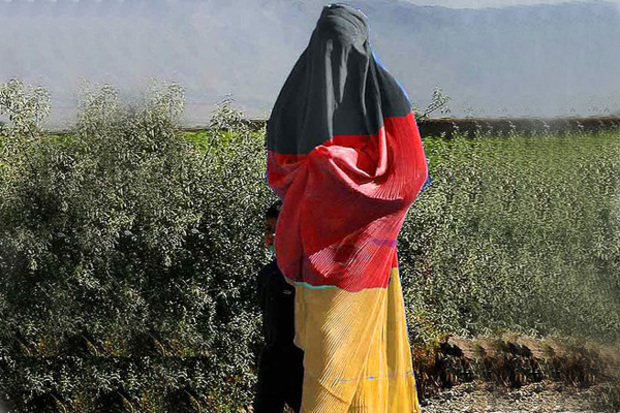Counterterrorism and the burqa
Following the twin attacks in Würzburg and Ansbach in July, a group of conservative interior ministers from Germany’s federal states have published a manifesto demanding enlarged competences for police, army, judiciary, and intelligence services. The politicians from the CDU/CSU party also demand the retraction of laws easing the acquisition of dual citizenship, passed by the red-green government of Gerhard Schröder in 2000.1.
While the Social Democratic Party (SPD), the conservatives’ coalition partner in Berlin, has flatly rejected calls to abolish dual citizenship, responses to added security measures have been more mixed. Yet what has taken centre stage in recent days is another demand from the manifesto – a proposed ‘burqa ban’. This is in spite of the fact that the precise security benefit from such a ban has remained largely unexplored. The initially security-focused discussion has thus gradually morphed into a debate with vaguely ‘civilisational’ overtones.
Echoing many of his colleagues in an opinion piece for the Frankfurter Allgemeine newspaper, leading CDU politician Jens Spahn deems burqa and niqab to be incompatible with the values of an open society and with the kind of public interaction such a society necessitates. According to him, these items of clothing also undermine the integration of recently arrived refugees.2 In an interview in late July, Spahn had struck a distinctly more polemical note, declaring himself to be a “burkaphobe” and accusing Muslims of being sexually repressed. As a remedy, Spahn encouraged Muslims to shower in the nude while at the gym.3
Constitutional hurdles
Yet whether a blanket ban on the burqa as Spahn and others demand it would even withstand scrutiny by the German Federal Constitutional Court (Bundesverfassungsgericht) is uncertain at best. In the past, the court has generally set high hurdles to potential state regulation of religious practices. Consequently, already in 2010 a German parliamentary committee came to the conclusion that a straightforward burqa ban would be unconstitutional.4
In view of this fact, politicians not just from the CDU but also from the SPD appear to move away from a general ban to more targeted restrictions: more recent interventions in the debate propose prohibiting women from wearing burqa or niqab when appearing in front of a judge or when driving a car.5
The calmer voices in the often agitated discussion have sought to critique the focus on the burqa as a false debate obscuring the real issues. Indeed, the number of burqa-wearing women in the country is very small, ranging between a few dozen and several hundred.6 As the Muslim CDU politician Cemile Giousouf stated, “I am against the burqa but it is not the core problem – an extremist understanding of religion is.” Moreover, according to her, “the experience in France shows that a burqa ban does not provide greater security.”7
From burqa to burkini
France itself, among the pioneers of a burqa ban, has since moved on to debate the ‘burkini’, a piece of swimwear covering all of a woman’s body with the exception of face, hands, and feet.8 This debate has been considerably more muted in Germany, where the focus has remained on face-covering burqas and niqabs. Indeed, the German Constitutional Court has implicitly legitimised the burkini in the past, when it ruled that co-educational swimming classes in public schools were mandatory, and that those Muslim girls uncomfortable with a co-educational arrangement could wear burkinis.9
In spite of this, in mid-August German Muslim woman reported an incident in which she and one of her daughters were asked to leave a water park near Berlin since their burkinis were deemed to be “inappropriate clothing”. Speaking to Berliner Zeitung, the mother asserted that wearing the burkini was her own independent choice; a choice that one of her daughters had also made while her other daughter had stuck to regular Western swimsuits. Interestingly, she went on to add that she disliked full-body veiling and that she agreed with a burqa ban, but noted that a burkini for her was a completely different thing.10
All of this amply demonstrates that the body of Muslim women is back at the centre of attention. After the string of attacks in Europe and amidst unresolved questions regarding immigration, however, a nuanced engagement with this topic seems to have become even more difficult to achieve.
Sources
http://www.haz.de/Nachrichten/Politik/Deutschland-Welt/Innenminister-der-Union-fordern-Burka-Verbot ↩
http://www.faz.net/aktuell/politik/inland/warum-burka-und-niqab-nicht-nach-deutschland-gehoeren-14393282.html ↩
http://www.welt.de/politik/deutschland/article157398148/Ein-Verbot-ist-ueberfaellig-Ich-bin-burkaphob.html ↩
http://www.sueddeutsche.de/politik/verbotsdebatte-burka-verbieten-geht-das-ueberhaupt-1.3123311 ↩
http://www.n-tv.de/politik/Burka-am-Steuer-soll-verboten-werden-article18438906.html ↩
http://www.sueddeutsche.de/politik/verbotsdebatte-burka-verbieten-geht-das-ueberhaupt-1.3123311 ↩
http://www.haz.de/Nachrichten/Politik/Deutschland-Welt/Cemile-Giousouf-Burkaverbot-bietet-nicht-mehr-Sicherheit ↩
http://europe.newsweek.com/burkini-swimsuits-spark-anti-muslim-outrage-sales-488138?rm=eu ↩
http://www.faz.net/aktuell/politik/inland/bundesverwaltungsgericht-schwimmunterricht-in-burkini-fuer-muslimische-maedchen-zumutbar-12569208.html ↩
http://www.berliner-zeitung.de/berlin/streit-in-bad-saarow–was–bitte-schoen–ist-an-einem-burkini-so-schlimm—24599592 ↩






